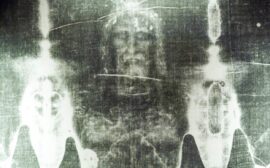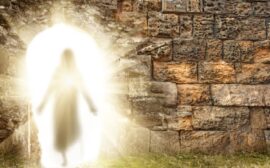The Evidence for the Resurrection of Jesus Christ
Part 3: Prophetic Witness
by: Pastor Brian Chilton
Have you ever had a premonition; you know a feeling like you have done something before or a feeling like something bad might happen if you continue doing something that you know is wrong? Many people will pass off premonitions, but what if those premonitions came together in a logical sequence that was beyond dispute? In such a case, a person may be compelled to believe that someone was trying to tell them something.
With the life of Jesus of Nazareth, we find a multitude of prophecies that were fulfilled during His lifetime that cannot be dismissed. Although time and space will not allow us to investigate all the prophecies that Jesus fulfilled, we do want to take the time to examine the prophecies that were fulfilled by the resurrection of Christ.
It must be noted that no one in the first century was expecting the Messiah to raise from the dead after His death. The fact is many did not consider that the Messiah would be executed on a Roman cross. Most were expecting a military leader who would free Israel from the bondage of the Roman Empire. N.T. Wright writes,
The real problem was that resurrection was from the very beginning a revolutionary doctrine. For Daniel 12, resurrection belief went with dogged resistance and martyrdom. For Isaiah and Ezekiel, it was about YHWH restoring the fortunes of his people…Resurrection is precisely concerned with the present world and its renewal, not with escaping the present world and going somewhere else; and, in its early Jewish forms right through to its developed Christian forms, it was always concerned with divine judgment, with the creator god acting within history to put right that which was wrong.[1]
So, we must consider that fact as we move forward.
Three passages of Scripture stand out as prophecies concerning the resurrection of the Son of God: Job 19:25-27, Psalm 16:10-11, and the last portion of Isaiah 53. In this brief article, let us examine these three passages as it relates to the resurrection of Jesus Christ.
The first passage of Scripture comes from what many consider the oldest book in the Bible, the Book of Job. Job writes, “As for me, I know that my Redeemer lives, and at the last He will take His stand on the earth. 26 “Even after my skin is destroyed, yet from my flesh I shall see God; 27 Whom I myself shall behold, and whom my eyes will see and not another. My heart faints within me!”[2] Job brings out some important points that we must consider that points to the resurrection of the Messiah. First, Job points to the “Redeemer”גָּאַל This “Redeemer” would be like an avenger, or “kinship redeemer,” who would free Job from the bondage that he was suffering. Remember, Job was suffering a lot of physical anguish at this time. So, who could deliver him but God? No one. Second, Job points to the fact that the Redeemer would be a ruler at the end of time. Job refers to the kingly reign of the Messiah/Redeemer. Finally, Job recognizes that he will be resurrected. Job speaks of his bodily death. Then, Job says that “in his flesh I shall see God.” Job is clearly pointing to his own resurrection. Okay, so we see that Job believes in resurrection, but how does this point to the Messiah’s resurrection? If the Messiah were to be able to resurrect the dead which Job gives indication, then the Messiah must be able to be resurrected. Granted this is not a clear indication that the Messiah would resurrect from the dead. However, it does show the power of the Messiah to be resurrected.
Another text points more clearly to the resurrection of the Messiah. David writes in Psalm 16, “For You will not abandon my soul to Sheol; nor will You allow Your Holy One to undergo decay. 11 You will make known to me the path of life; in Your presence is fullness of joy; in Your right hand there are pleasures forever.“[3] In this passage of Scripture, we find that the Psalmist shows that the Messiah, or “Holy One,” would not undergo the decomposition of the grave. Notice that the Psalmist has discussed his own mortality before mentioning the Holy One. Then, the Psalmist continues to point to the fact that the Holy One would lead him to the “path of life.” This indicates that the Holy One would have the power of life. Therefore, this points to the fact that the Holy One had power over death. The Messiah, or the “Holy One,” would never see decomposition, and would live eternally. This points to the resurrection of the Messiah, maybe not explicitly, but it is definitely implied.
Finally, we see Isaiah give a powerful rendering of the Messiah’s work in Isaiah 53. We know the portion of Scripture in Isaiah 53 that denotes a “Suffering Servant.” But have we noticed the last part of the chapter, especially the last portion of verse 10? Isaiah writes,
10 But the Lord was pleased
To crush Him, putting Him to grief;
If He would render Himself as a guilt offering,
He will see His offspring,
He will prolong His days,
And the good pleasure of the Lord will prosper in His hand.
11 As a result of the anguish of His soul,
He will see it and be satisfied;
By His knowledge the Righteous One,
My Servant, will justify the many,
As He will bear their iniquities.
12 Therefore, I will allot Him a portion with the great,
And He will divide the booty with the strong;
Because He poured out Himself to death,
And was numbered with the transgressors;
Yet He Himself bore the sin of many,
And interceded for the transgressors.[4]
Isaiah points to the fact that the Messiah would suffer and die for the sins of the people. But, notice in verse 10 that Isaiah writes that God would “prolong His days.” How does one prolong one’s days after death has occurred? Well, it could transpire with a resurrection event. Notice, too, Isaiah points that God would “allot Him a portion with the great, and He will divide the booty with the strong; because He poured out Himself to death.” Wait! How does this happen in the physical sphere? Well, it can happen with a resurrection event.
Some will argue that these passages are not explicit in their references to the resurrection. But, I would argue that they are explicit enough. A clear examination of these texts bring forth evidence that the resurrection of the Messiah was prophesied long ago. Perhaps the implicit nature to some of these texts caused it to be missed in the first century when no one was expecting the Messiah to rise from the dead…especially after crucifixion. Although the resurrection was a surprise to the early church, it was of no surprise to God…the giver of life and creator of all things.
Bibliography
All Scripture used in this article, unless otherwise noted comes from New American Standard Bible: 1995 Update (LaHabra, CA: The Lockman Foundation, 1995).
Wright, N.T., The Resurrection of the Son of God (Minneapolis: Fortress Press, 2003).
[1] N.T. Wright, The Resurrection of the Son of God (Minneapolis: Fortress Press, 2003), 138.
[2] All Scripture used in this article, unless otherwise noted comes from New American Standard Bible: 1995 Update (LaHabra, CA: The Lockman Foundation, 1995), Job 19:25–27.
[3] Ps 16:10–11.
[4] Is 53:10–12.




